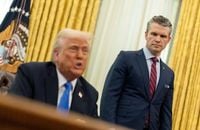President Donald Trump has made a significant shift in U.S. Middle East policy by removing the requirement for Saudi Arabia to normalize relations with Israel as a condition for advancing civil nuclear talks. This decision marks a notable departure from the previous administration's approach and comes just ahead of Trump’s planned visit to Saudi Arabia, where discussions on nuclear energy cooperation, regional security, and economic agreements are expected to take center stage.
Under the Biden administration, Washington had insisted that Saudi nuclear ambitions were contingent upon the kingdom establishing formal ties with Israel, a strategy reminiscent of the efforts that led to the Abraham Accords. However, Saudi Arabia has consistently maintained that it would not recognize Israel without the establishment of a Palestinian state. By decoupling these issues, Trump has allowed for nuclear discussions to progress independently, a move that has raised concerns among Israeli officials.
According to a senior Israeli official, the current U.S. administration lacks the necessary Senate support to finalize a nuclear cooperation agreement with Saudi Arabia without Israeli endorsement. This has led to fears that Israel's interests may be sidelined as the U.S. pursues its new diplomatic path.
A central issue remains Saudi Arabia's reluctance to sign a Section 123 agreement under the U.S. Atomic Energy Act, which prohibits uranium enrichment and the reprocessing of spent fuel—activities that could potentially lead to the development of nuclear weapons. Saudi Arabia is seeking the right to enrich uranium on its own soil, and a potential compromise is being discussed in the form of a "black box" model, where U.S. personnel would have exclusive access to any Saudi-based enrichment facilities.
This nuclear ambition is part of Crown Prince Mohammed bin Salman’s Vision 2030 strategy, which aims to diversify the kingdom’s energy sources. By moving towards nuclear power, Saudi Arabia hopes to reduce domestic oil consumption and increase crude exports. However, this prospect has alarmed arms control advocates, especially given the crown prince's previous comments about acquiring nuclear weapons should Iran do so.
Adding to Israel's sense of exclusion from the U.S. strategic dialogue, President Trump has no plans to visit Israel during his upcoming trip, which will instead include stops in Saudi Arabia, the United Arab Emirates, and Qatar. Trump is expected to host a summit with leaders of the Gulf Cooperation Council, focusing on expanding trade and investment. This includes discussions of a potential $100 billion U.S. arms package and a $1 trillion Saudi investment pledge.
Israeli officials have expressed growing unease about being left out of critical decisions. Prime Minister Benjamin Netanyahu has emphasized Israel’s readiness to defend itself independently, while Defense Minister Israel Katz stated, "Israel must be able to defend itself by its own forces against any threat and any enemy."
As U.S.-Saudi negotiations advance, questions linger about whether Trump's approach will lead to meaningful breakthroughs or exacerbate existing tensions. The administration’s evolving diplomatic priorities are further underscored by the recent cancellation of U.S. Defense Secretary Pete Hegseth's scheduled visit to Israel. Originally intended to be Hegseth’s first trip in his current role, he will instead accompany Trump to the Gulf states.
This change raises further questions about the administration's commitment to traditional alliances and the implications for regional stability. Trump’s refusal to tie Saudi-Israeli normalization to nuclear cooperation represents a significant policy shift that could reshape the dynamics in the Middle East.
Trump's upcoming Middle East tour is expected to focus on securing investment deals from Gulf states, aimed at supporting U.S. economic initiatives. White House sources indicate that the president will prioritize “deals” over major diplomatic breakthroughs, with a particular emphasis on opportunities to enhance investment from these wealthy nations and deepen cooperation in areas like artificial intelligence and energy.
Despite the lack of expected breakthroughs with Saudi Arabia during this trip, the administration views face-to-face meetings as essential for maintaining momentum towards normalization. Jared Kushner, a key figure in the previous administration's Middle East policy, has been informally advising Trump’s team and remains in close contact with officials preparing for high-stakes discussions with Gulf leaders.
Kushner, who played a central role in negotiating the Abraham Accords, is expected to influence conversations around economic cooperation and the potential expansion of normalization agreements with Israel. His relationships with Arab leaders, particularly Crown Prince Mohammed bin Salman, could prove invaluable as the administration seeks to navigate delicate discussions.
While significant breakthroughs are not anticipated, the Trump administration's efforts to revive and expand the Abraham Accords remain a long-term objective. The administration is particularly focused on fostering Saudi-Israeli normalization, which includes negotiations for a mutual defense treaty and a civil nuclear energy agreement.
As the U.S. engages with Saudi Arabia, questions about the viability of these agreements persist, particularly in light of ongoing tensions in Gaza and the broader implications for regional security. The unsettled conflict poses a bottleneck to progress, complicating efforts to advance normalization while the situation remains precarious.
In conclusion, Trump’s upcoming visit to the Middle East represents a crucial moment for U.S. foreign policy in the region. With a focus on economic engagement and strategic realignment, the administration faces the challenge of balancing its interests with the complex realities on the ground. The potential for significant diplomatic achievements may hinge on the ability to navigate these intricate dynamics effectively.


